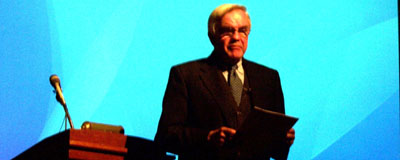
Science and religion, often at odds when it comes to explaining creation, are now speaking with one voice when it comes to preserving creation. A news conference was held in Washington D.C. last month, featuring leaders from the scientific world as well as from evangelical Christianity. One of the participants, University of Wisconsin professor Calvin DeWitt, reviewed the event in a lecture at the Wisconsin State Historical Society auditorium last night.
DeWitt is a professor at the Gaylord Nelson Institute for Environmental Studies at the UW-Madison, and also the founder of the Au Sable Institute, which provides courses in environmental studies for many of the top Christian colleges and Universities in the U.S. "He is a leader in bringing environmental issues into the consciousness of churches," said Vernon Visick of New College Madison, one of the sponsors of the lecture, as he introduced DeWitt.
DeWitt described a meeting held in late November and early December at a Georgia plantation, attended by 28 scientists and evangelical leaders who were strangers at first. "None of us knew the others except from reading their books," he said.
The leaders of the group included Rev. Rich Cizik, vice president for the National Association of Evangelicals, and Dr. Eric Chivian, a Nobel laureate and Director of the Harvard Medical School Center for Health and the Global Environment.
As they talked about their work and their concern for "creation," the word more and more of them are using for the environment, "there was a sense of something happening in the room. We were all speaking the same language."
They decided to formulate a statement expressing their concerns and release it at the National Press Club. In order to make sure the event was covered they engaged two public relations firms, one to work with the scientific media and one to work with the religious media.
Their Urgent Call to Action starts out, "We agree that our home, the Earth, which comes to us as that inexpressibly beautiful and mysterious gift that sustains our very lives, is seriously imperiled by human behavior."
It goes on to talk about the moral imperative of protecting life on earth, and the concern for the poorest of earth’s inhabitants who are most impacted by earth’s devastation. And it concludes by declaring the need for immediate action to change values, lifestyles and policies.
DeWitt played several video clips of statements made at the news conference by a number of the scientists and religious leaders.
"It’s not just a technical problem but a moral imperative," said David Gushee, a professor at Union University, noting that ever since the Scopes Monkey Trial science and religion had engaged in conflict and misunderstanding. E. O. Wilson, Professor Emeritus in the Department of Organismic and Evolutionary Biology at Harvard University said "the direction we take will be an ethical decision. We have to have religious intensity."
"The task ahead is a prophetic one," said Dr. Cheryl Johns, a Professor at the Church of God Theological Seminary. "We need to speak with urgency and compassion."
DeWitt noted that up to the mid-1800’s some pastors were also known as experts in nature study. The belief at the time was that creation was another book to be read, just like the Bible, to learn about God. "We went from seeing nature as a book to seeing it as a bag of resources," DeWitt said, noting that was about as accurate as describing his audience in terms of hamburger.
Describing the natural world as a "remarkable symphony of symphonies," DeWitt said that each member of the group shared a sense of wonder at the beauty of the earth, and an underlying rage at the destruction it was experiencing.
Observing that there is some entrenched opposition to the concept of global climate change in some conservative religious circles, DeWitt expressed optimism that those views were starting to change. "Evangelicals insist they believe in God as creator but they don’t really know what that means," he said. "The beautiful thing about evangelicals is that they’re used to conversion, and they can turn on a dime."
DeWitt also said that many of the scientists in the group seemed very open to belief in God the creator.
"What’s coming out of this movement is going to be a big thing, because of the actors in it," he concluded. He said it’s just getting started and each one involved has pledged to do what they can in their own circles to draw attention to the crisis in God’s creation.
Other sponsors of DeWitt’s lecture, part of the Geneva Forum series, included Geneva Campus Church, the Bradshaw-Knight Foundation, InterVarsity Faculty and Graduate Ministries, the Isthmus Society, the Catacombs Coffeehouse and The Crossing Campus Ministry.

